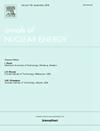An interpretable deep transfer learning method for fault diagnosis of nuclear power plants under multiple power level conditions
IF 2.3
3区 工程技术
Q1 NUCLEAR SCIENCE & TECHNOLOGY
引用次数: 0
Abstract
Nuclear power plants (NPPs) operations under different power level conditions (i.e., different operating modes) often exhibit non-independent and identically distributed (non-IID) characteristics in their fault-related parameters, posing significant challenges to traditional data-driven fault diagnosis methods. To address this issue, the study proposes a fault diagnosis approach that combines deep transfer learning with an interpretable multi-variable gated recurrent unit (IMV-GRU) model. The proposed approach incorporates a hybrid loss strategy integrating adaptive focal loss (AFL) and maximum mean discrepancy (MMD) to improve cross-power-level feature transfer capability. The interpretability of IMV-GRU is demonstrated through its autonomous quantification of multi-variable contribution degrees, enabling feature selection to optimize computational efficiency and mitigate interference from non-key variables. Experimental results demonstrate that the proposed method is effective in cross-power-level fault diagnosis, with particularly significant accuracy improvements under sparse data conditions. Furthermore, the effectiveness of extracting multi-variable contribution degrees is validated, highlighting its value in fault diagnosis.
多功率工况下核电厂故障诊断的可解释深度迁移学习方法
核电厂在不同功率水平条件下(即不同运行模式下)运行时,其故障相关参数往往表现出非独立和同分布(non-IID)特征,这对传统的数据驱动故障诊断方法提出了重大挑战。为了解决这一问题,该研究提出了一种将深度迁移学习与可解释的多变量门控循环单元(IMV-GRU)模型相结合的故障诊断方法。该方法采用自适应焦损(AFL)和最大平均差异(MMD)相结合的混合损耗策略,提高了跨功率级特征传递能力。IMV-GRU的可解释性通过其对多变量贡献程度的自主量化来证明,使特征选择能够优化计算效率并减轻非关键变量的干扰。实验结果表明,该方法对跨功率级故障诊断是有效的,在稀疏数据条件下,准确率有了显著提高。进一步验证了多变量贡献度提取的有效性,突出了其在故障诊断中的价值。
本文章由计算机程序翻译,如有差异,请以英文原文为准。
求助全文
约1分钟内获得全文
求助全文
来源期刊

Annals of Nuclear Energy
工程技术-核科学技术
CiteScore
4.30
自引率
21.10%
发文量
632
审稿时长
7.3 months
期刊介绍:
Annals of Nuclear Energy provides an international medium for the communication of original research, ideas and developments in all areas of the field of nuclear energy science and technology. Its scope embraces nuclear fuel reserves, fuel cycles and cost, materials, processing, system and component technology (fission only), design and optimization, direct conversion of nuclear energy sources, environmental control, reactor physics, heat transfer and fluid dynamics, structural analysis, fuel management, future developments, nuclear fuel and safety, nuclear aerosol, neutron physics, computer technology (both software and hardware), risk assessment, radioactive waste disposal and reactor thermal hydraulics. Papers submitted to Annals need to demonstrate a clear link to nuclear power generation/nuclear engineering. Papers which deal with pure nuclear physics, pure health physics, imaging, or attenuation and shielding properties of concretes and various geological materials are not within the scope of the journal. Also, papers that deal with policy or economics are not within the scope of the journal.
 求助内容:
求助内容: 应助结果提醒方式:
应助结果提醒方式:


